Five years after launching the European Green Deal, the EU is making tangible progress in delivering climate neutrality. However, as implementation deepens, success will be realised not through siloed initiatives or individual sectoral gains. It will hinge on a collaborative approach that addresses cross-cutting challenges such as skills, redirecting finance, and local delivery.
Transformational change depends on the right skills, finance, and delivery mechanisms, and calls for deeper levels of collaboration – among policymakers, with private actors, civil society, and citizens. In the face of an uncertain political environment, collaboration is also an overlooked approach to securing continuity of EGD. Collaboration incorporates multiple stakeholders in collective action by developing a shared vision to realise a common goal.
Delivering the energy transition using the potential of collaborative approaches:
- Local governments must act as orchestrators of local climate action by facilitating ownership of delivery across sectors and municipal departments.
- Private sector must embrace a longer-term vision and dedicate the necessary resources – knowledge, financial, human – to innovative transition pathways.
- CSOs must identify and engage with unusual allies, supporting initiatives by fostering trust and people-centered approaches.
In the face of shifting political landscapes, deep collaboration stands as a shield against backlash and uncertainty, and a springboard for a fairer and faster transition. Yet, its true power lies in uniting diverse voices to pioneer new paths, where every step pulses with the energy of collective action.
This briefing presents a deep dive into several examples of effective collaboration and a framework to understand and embrace it at deeper levels. This will support stakeholders – including local governments, private sector, and CSOs – to situate their ongoing efforts, adjust strategies according to the goal they want to reach and identify next steps.


